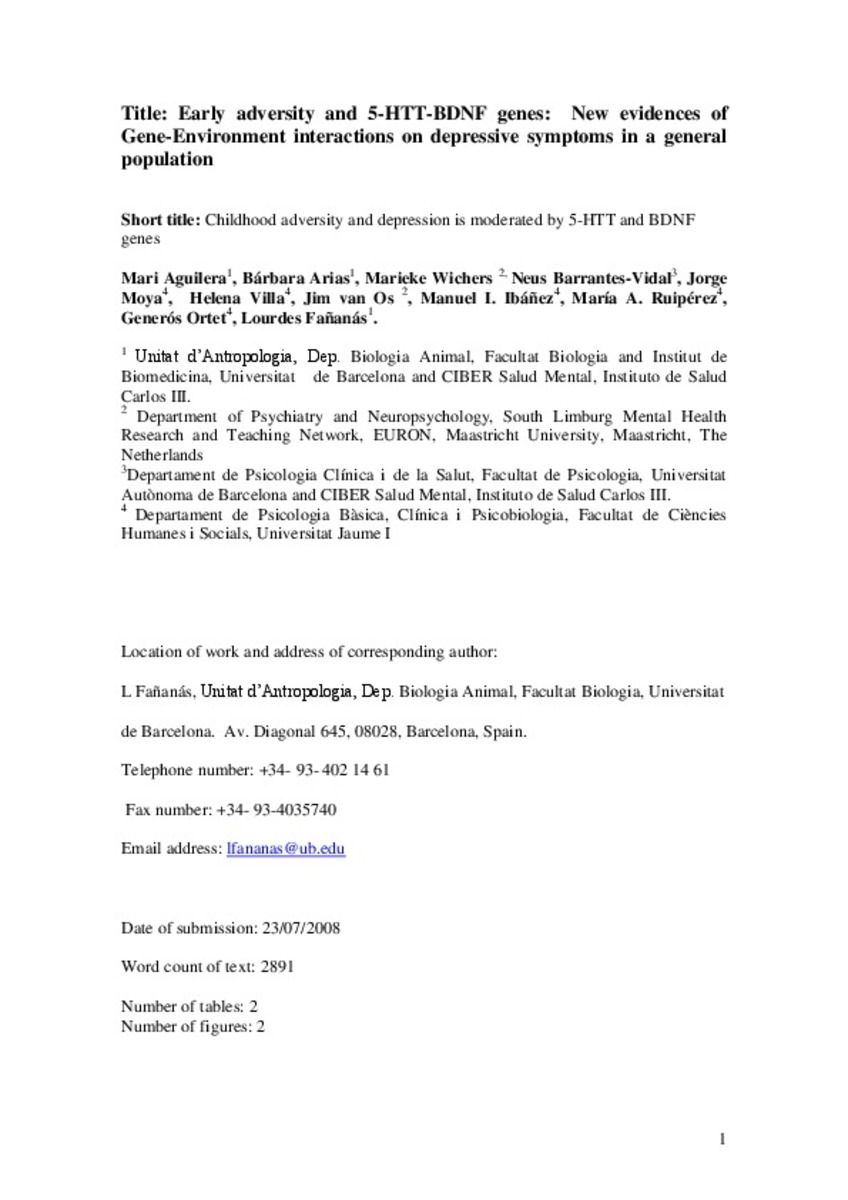Mostrar el registro sencillo del ítem
Early adversity and 5-HTT-BDNF genes: new evidences of gene-environment interactions on depressive symptoms in a general population
| dc.contributor.author | Aguilera, Mari | |
| dc.contributor.author | Arias, Barbara | |
| dc.contributor.author | Wichers, Marieke | |
| dc.contributor.author | Barrantes Vidal, Neus | |
| dc.contributor.author | Moya-Higueras, Jorge | |
| dc.contributor.author | Villa Martín, Elena | |
| dc.contributor.author | Van Os, Jim | |
| dc.contributor.author | Ibáñez, Manuel I | |
| dc.contributor.author | Ruipérez Rodríguez, María Ángeles | |
| dc.contributor.author | Ortet, Generós | |
| dc.contributor.author | Fañanás Saura, Lourdes | |
| dc.date.accessioned | 2011-08-25T07:01:14Z | |
| dc.date.available | 2011-08-25T07:01:14Z | |
| dc.date.issued | 2009-09 | |
| dc.identifier.issn | 0033-2917 | |
| dc.identifier.uri | http://hdl.handle.net/10234/27224 | |
| dc.description.abstract | Adverse childhood experiences have been described as one of the major environmental risk factors for depressive disorder. Likewise, the deleterious impact of early traumatic experiences on depression seems to be moderated by individual genetic variability. Serotonin transporter (5-HTT) and the Brain-Derived Neurotrophic Factor (BDNF) seem to modulate the effect of childhood adversity on adult depression, although inconsistencies across studies have been found. Moreover, the GxE interaction concerning the different types of childhood adversity remains poorly understood. The aim of this study is to analyse the putative interaction between the 5-HTT gene (5- HTTLPR polymorphism), BDNF gene (Val66Met polymorphism) and childhood adversity in accounting for adult depressive symptoms Method A sample of 534 healthy individuals filled in self-report questionnaires of depressive symptomatology [the Symptom Check List 90 Revised (SCL-90-R)] and different types of childhood adversities [the Childhood Trauma Questionnaire (CTQ)]. The 5-HTTLPR polymorphism (5-HTT gene) and the Val66Met polymorphism (BDNF gene) were genotyped in the whole sample. Results Total childhood adversity (β=0.27, p<0.001), childhood sexual abuse (CSA; β=0.17, p<0.001), childhood emotional abuse (β=0.27,p<0.001) and childhood emotional neglect (β=0.22, p<0.001) had an impact on adult depressive symptoms. CSA had a greater impact on depressive symptoms in Met allele carriers of the BDNF gene than in the Val/Val group (F=5.87, p<0.0001), and in S carriers of the 5-HTTLPR polymorphism (5-HTT gene) (F=5.80, p<0.0001). Conclusions Childhood adversity per se predicted higher levels of adult depressive symptoms. In addition, BDNF Val66Met and 5-HTTLPR polymorphisms seemed to moderate the effect of CSA on adult depressive symptoms | |
| dc.format.extent | 22 p. | |
| dc.language.iso | eng | |
| dc.publisher | Cambridge University Press | |
| dc.relation.isPartOf | Psychological medicine, vol. 39, no. 9 (Sep. 2009), pp. 1425-1432 | |
| dc.rights | © 2009 Cambridge University Press | |
| dc.rights.uri | http://rightsstatements.org/vocab/InC/1.0/ | * |
| dc.subject | BDNF Val66Met | |
| dc.subject | Childhood adversity | |
| dc.subject | Depression | |
| dc.subject | GrE interaction | |
| dc.subject | 5-HTTLPR | |
| dc.subject.lcsh | Depression, Mental | |
| dc.subject.other | Depressió psíquica | |
| dc.title | Early adversity and 5-HTT-BDNF genes: new evidences of gene-environment interactions on depressive symptoms in a general population | |
| dc.type | info:eu-repo/semantics/article | |
| dc.identifier.doi | http://dx.doi.org/10.1017/S0033291709005248 | |
| dc.rights.accessRights | info:eu-repo/semantics/openAccess | |
| dc.type.version | info:eu-repo/semantics/submittedVersion |
Ficheros en el ítem
Este ítem aparece en la(s) siguiente(s) colección(ones)
-
PSB_Articles [1301]
Articles de publicacions periòdiques







